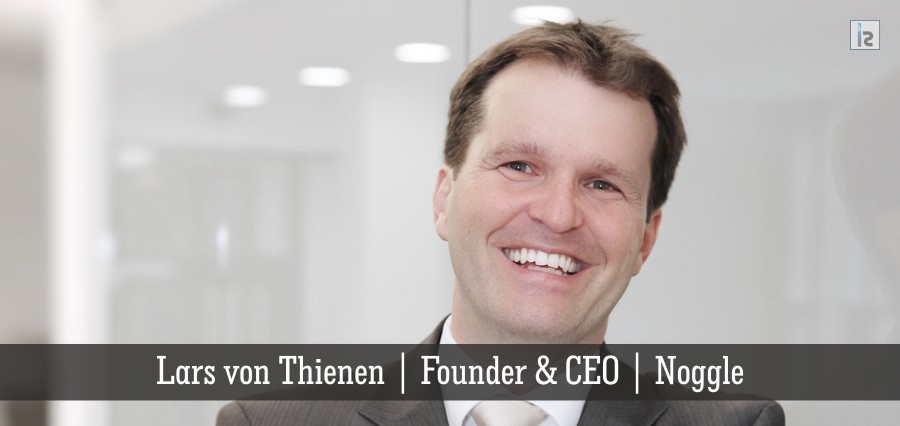Today, most of the business methods and software suites are built around the concept of centralized, top management and system approaches for large-scale corporations. Plus, even the people are unable to manage their information and finding hard to identify, capture, evaluate, retrieve, and share information assets, to accomplish a task and get their job done.
Recognizing this, Lars von Thienen Founder and CEO of Noggle invited a standalone desktop search and knowledge management app named ‘Noggle AG’. Lars founded Noggle in response to a personal discovery to easily and quickly find, retrieve and share the numerous documents that he has shared or stored online. This way the need of a solution to lighten the personal information tracking overload, became the starting point for Noggle.
Today, Lars manages the Noggle’s strategic positioning and development roadmap, all the while focusing on making Noggle a vital tool in the digital workplace arena.
The Initial Phases
Lars began his software coding when he was a kid by starting with Commodore C64, followed by Amiga and then the first PCs during the 1980s. Nowadays, coding helps him relax after his hard day of business management. Others might play sports and socialize with friends to wind down and relax; Lars has become so confident in coding that he states he can do so while he is asleep.
He is not only an expert with coding, since prior to Noggle, he had supported the leading German DAX companies to develop their internet and business strategies. He used to supervise large-scale projects and managed IT service organizations. In addition, Lars had performed legal practices as a commercial judge for over a decade in the judicial system. He was appointed by the Minister for Justice. In this role, he was required to uphold the secrecy of deliberations, to show moderation, and to maintain neutrality.
The Core Feature of Noggle
At Noggle, Lars helps his team to focus on the core feature that is conducting cognitive searches for personal, private and team knowledge. This unique service fills a much-needed gap which instantly returns the desired results to the users, who then can create, update, and rapidly access their own personal knowledge library. In other words, this core feature stays local and the cognitive search function is not a cloud-based solution. Once located and retrieved, all documents and personal knowledge reside on local storage devices as Noggle does not require uploads or information sharing.
From the central starting point, the company created tailored Noggle solutions for individual use where the capability enables quick, efficient browsing of the user’s knowledge library. It also provides document auto-clustering. This eliminates the need to create and maintain a folder structure. Wherever a document is saved, Noggle uses its cognitive feature to find it and then build a content-based cluster of like documents.
In addition, the company provides image intelligence services and Noggle automatically tags photos and images. It detects people and adds picture descriptions in text. This information allows users to search and cluster pictures based on this text. In general, it diversify Noggle’s core requirements to suit its target audience, thus delivering personalized features for the digital workplace for users to retrieve and find relevant information from their personal knowledge files and libraries.
The Pinnacle of Learning
One key challenge is that technology needs to be understood and trusted by people; otherwise even the best “tech solution” will fail. That’s the reason simple things work for many users while good, helpful things that are too complex often get ignored.
At the earlier stage, Lars started Noggle with a complicated solution for knowledge management. Along the way, he learned how hard it was to explain all its benefits to potential users. In the end, the company’s user numbers were low, not because it was a bad solution but since he didn’t approach and develop the solution from a user perspective. During those early, he failed to focus on the ‘customer Journey’.
Soon Lars learned and recognized the hard way and decided to simplify its solution’s functionality, making it easier and simpler for average users to understand. This lesson taught Lars something very valuable and essential about the tech products in general. Recollecting his experiences, Lars says, “The key lesson is that technology needs to be understood and trusted by people; otherwise even the best “tech solution” will fail. Put bluntly, simplicity overrules unrealized benefits from complex solutions that average users do not trust.” Integrating these lessons, Noggle continues to create more user-centric solutions today.
Exploring the Future
As the information is no longer found to be free and democratic, the CEO of the company states “Knowledge should not be owned and stored via centralizing solutions instead it has to be directly linked to people and their individual retrieval capabilities that are neutral and unbiased”
So, Lars wants to continue his exploration on finding new features as a nerd and thinking about how to make people’s lives easier, especially regarding how new technologies can change the way of life. His goal is to make the people understand the way of storing, retrieving and sharing their knowledge of information in the digital workplace and suggesting everyone to fight against the centralistic solutions and monopolies which is currently ‘destroying’ the internet.
Website:- www.noggle.online
Source :-The 30 Most Influential Business Leaders in Tech 2018


